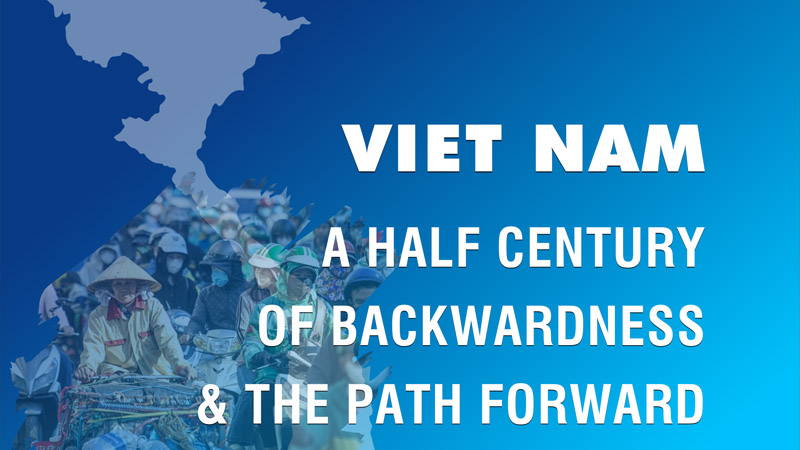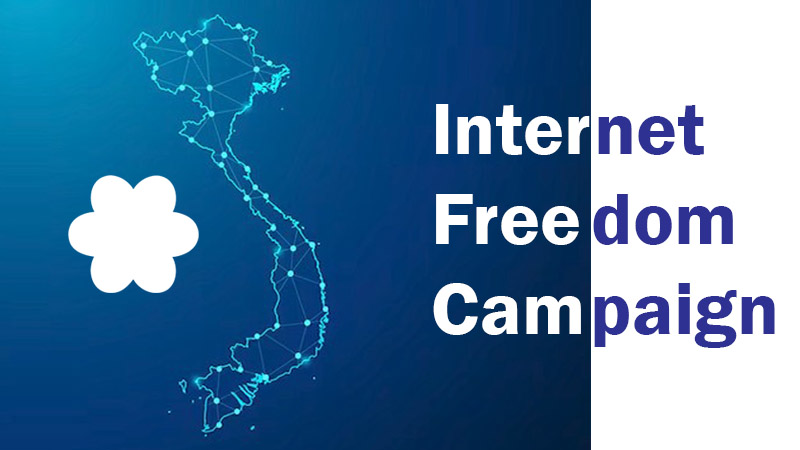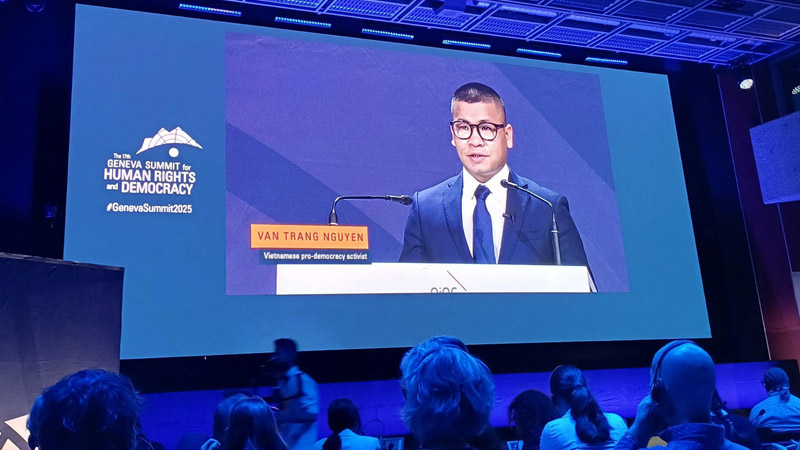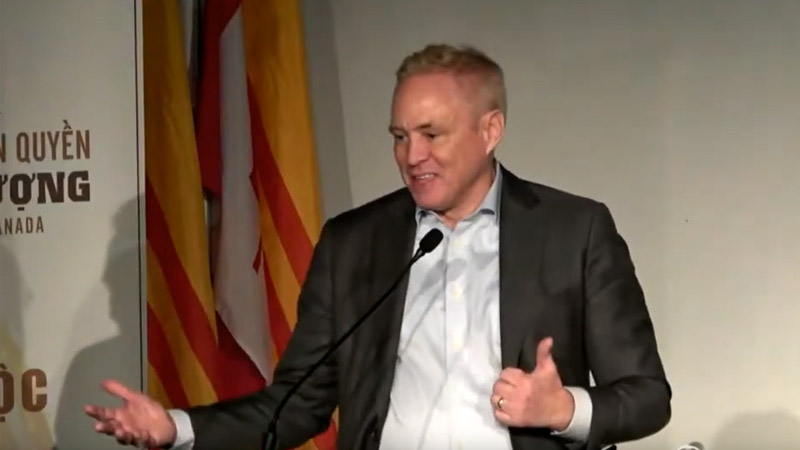On Tuesday March 13, 2012, the fourth annual Geneva Summit for Human Rights and Democracy gathered hundreds of courageous dissidents and human rights victims, activists, diplomats and student leaders to shine a spotlight on human rights violations and call on global action.
At the end of the Summit, Trinity Hong-Thuan from Radio New Horizon (Radio Chan Troi Moi) interviewed Arielle Herzog Hadida, Director of Special Projects at UN Watch. Arielle was also the head Coordinator for the Geneva Summit for Human Rights and Democracy.
March 13, 2012
Trinity Hong-Thuan: First of all, for the listeners who don’t know what the Geneva Summit for Human Rights and Democracy is, can you briefly share with us what this summit is about?

Arielle Herzog Hadida: The Geneva Summit is organized by UN Watch, in collaboration with 20 other NGOs, including Viet Tan. Some groups are working with multi-region human rights abuses and some are more country-specific. For example, we have a group focused on Sudan, a group focused Cuba, and some groups on China. We are organizing this event in parallel to the UN Human Rights Council Annual Session, with the idea to enhance and give the floor to dissidents and human rights activists from around the world. Usually they don’t have the chance to speak about their issues at the UN, and we think it’s important that there’s a forum where they can raise their countries’ specific situations, their persons, their stories, and we’re trying to reach a very large public. The conference had five hundred participants today, and two thousand people have followed the live webcast online.

Radio New Horizon: I know this is the fourth consecutive year in which the summit has been held. So what are some of the goals that this year’s summit wants to achieve?
Arielle Herzog Hadida: Our goal is really to offer this platform where human rights activists can speak out. It’s also to try to raise awareness on some of the worst human rights situations around the world. And finally, it’s really to be a parallel platform to the United Nations where activists can speak about human rights. We also issued a draft resolution that we have presented at the UN Human Rights Council, and we have given them to some ambassadors, asking them to take actions on some specific country situations. The resolution concerns, for example, Vietnam, Zimbabwe, Venezuela, China, Saudi Arabia, and all countries that the Human Rights Council usually not addressing at all. This resolution has been drafted by the partner organizations and the speakers. We have distributed them during the summit and we have all decided to try to take action as much as possible on that.
Trinity Hong-Thuan: Looking at the summit’s website, I see that this years’s program includes workshops on women’s rights, internet freedom, and democracy. Internet Freedom has been a huge concern recently in countries under dictatorship. We know its power after what we’ve witnessed happening in the Middle East and North Africa – how social media was a big factor in bringing down different dictators. And in Vietnam today, as you probably already knew, the government has been very active in cracking down and arresting journalists and bloggers. So tell us more about this emphasis on Internet Freedom during today’s summit.
Arielle Herzog Hadida: Yes, absolutely, Internet Freedom is a subject that we have been addressing at the Geneva Summit for the past three years. Even before the Arab Spring, we decided instead of having a session only on Internet Freedom we will ask every speaker to include in their speech a little bit about the situation on Internet Freedom in their country. Some of them have done it, some have spoke about it a little bit less. But it’s a good way [to incorporate this theme] because the Internet, for most of these activists, is their every day tool to promote human rights. It doesn’t need to be an issue on itself. But the Geneva Summit in the past has been very active on Internet Freedom. Two years ago, we issued an Internet Freedom declaration which called on governments to really increase the access for people to the Internet, especially for countries like Vietnam and China where the Internet is heavily monitored and activists are often jailed for what they are blogging or writing on their Facebook page.
Trinity Hong-Thuan: Right, and in countries such as Vietnam, social media tools like Facebook is intermittently banned…
Arielle Herzog Hadida: Absolutely, in Vietnam and China, some of those tools are completely blocked. It is very interesting thing to discuss in a larger forum because you see some countries where there is no Internet access – like Cuba where less than two percent of the population have Internet access mainly because the government doesn’t want the people to be informed. And you see in other countries like in Egypt where most people had Internet access, this had a huge impact on promoting democracy. And this is a huge tool that people are using to promote democracy.
So today we had a speaker from Egypt, Maikel Nabil, who is a blogger and has spent a few years in jail. Recently, he was arrested after the fall of Mubarak for writing on his blog that the military is not better than Mubarak. And for that he was jailed for eleven months in solidarity confinement and in difficult conditions. It is important to show it’s a work in progress, even in countries where we think things are getting better it’s still difficult for activists to raise their voice, to say whatever they want to say.
Trinity Hong-Thuan: It is quite exciting to see that the summit has provided such an awesome forum for different dissidents and human rights activists to speak on their issues and to bring their issues out to the world. In your personal opinion, what do you think are some of the successes of this year’s summit?
Arielle Herzog Hadida: It’s always difficult to say when you’re doing a Summit. We always have a large base of people who are interested in it, who follow it, discussing it. We have increased our partnerships with a lot of organizations and a lot of speakers with whom we are still in touch, sending us information, trying to put us in contact with other partners. We have frequently connected them to the UN, to speak with diplomats, to speak with UN officials to raise awareness about their countries’ specific situations. So in all of that, in certain ways, this is the success of the event.
The summit is getting bigger and bigger every year. More people are registering, more people are interested in it. More people are traveling to attend it. In that sense, that is how we can quantify the success. We are quite happy this year to see a lot of media coverage. This is also an important way to promote the human rights situations we are trying to raise during the summit.
Trinity Hong-Thuan: I do see a very impressive list of speakers, which also include Vietnamese activists from Viet Tan.

Arielle Herzog Hadida: Yes. Vietnam has been one of the subject of the Geneva Summit for the past three years. It’s a very important issue that is very seldom addressed. For example, the UN Human Rights Council have almost never spoken about it. It was very important to us to raise this issue.
Trinity Hong-Thuan: Lastly, for those who are listening from around the world, especially in Vietnam, what are some messages you would like to send them?
Arielle Herzog Hadida: Well I want to tell them that everyone should have freedom and should have the liberty to say whatever they want to say, to choose their government, to be able to have free press, to have a good judicial system, to basically have every right that every human being should be allowed to have. I really hope that Vietnam will reach that level soon and that we don’t need to address human rights situation in Vietnam anymore at the Geneva Summit, because things will be better and people can live in freedom and democracy and have all the rights they are allowed to have.
Trinity Hong-Thuan: Once again, thanks for speaking with us tonight.
By Trinity Hong-Thuan for Radio New Horizon





